“Tell me and I forget, teach me and I may remember, involve me and I learn.” – Benjamin Franklin.
Sales professionals have evolved from their traditional counterparts.
Today, they have to face a myriad of new and emerging challenges, from personalizing experiences and integrating AI to embracing social selling, navigating data silos, and adapting to disruptive technology.
You can tell and teach your sales team how to establish contact and build relationships with prospects to sell products or services.
If you want each sales representative to increase their future performance and growth, you’ll need to involve them in sales training.
Quality sales training has the potential to boost a sales team’s confidence, improve their performance, and inspire them to accomplish their goals.
But in today’s competitive market, a one-size-fits-all approach to sales training is no longer sufficient.
Your team needs tailored training to truly excel in sales that address their unique strengths, weaknesses, and learning styles.
That’s why we’ve compiled a list of top sales training ideas, activities, and games. Take a look at the list to find the most effective methods and programs for coaching your sales team.
A. What is sales training?
Sales training is the process of educating and equipping your sales team with certain skills to improve their performance and get the desired results.
It is like a special program that provides various types of coaching, activities, games, and ideas for sales training to achieve specific business objectives.
Sales training helps salespeople build relationships, enhance communication skills, gain knowledge, boost productivity, and ultimately sell more products and services.
This training covers topics such as how to effectively build customer relationships, enhance communication skills, gain product knowledge, leverage modern sales technologies, boost productivity, meet customer expectations, and sell more products and services.
Sales training programs may be conducted through various formats, including in-person workshops, online courses, coaching sessions, role-playing exercises, and on-the-job training.
B. 31 interesting sales training ideas to consider today
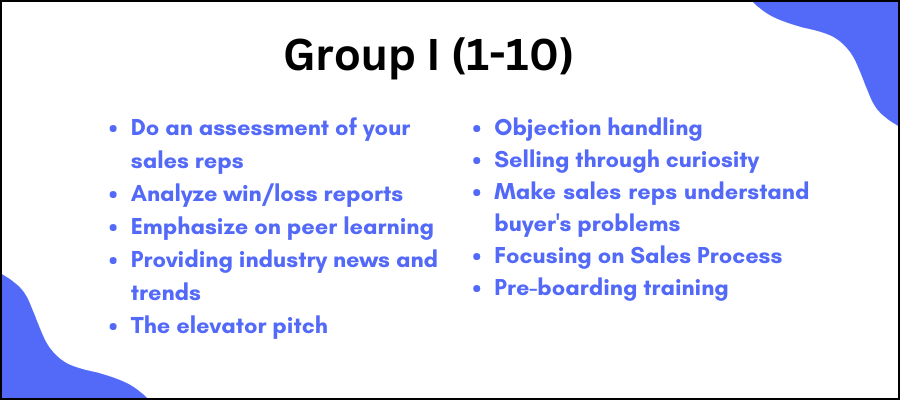
1. Do an assessment of your sales reps
It has been observed that many times organizations believe that sales reps who have completed their training are ready to sell to a customer.
But it proves to be a disaster as sales reps are low in confidence in front of the buyers, costing important deals, tossing up the brand reputation, and wasting the time of everyone.
Sales managers should not only focus on the training part but also the assessment part to help sales rookie to increase their knowledge base and be sales-ready.
You can assess an individual in different ways like:
2. Analyze win/loss reports
You can learn a lot from your key wins (and losses). For that, you must prepare detailed reports of key wins and losses and make it available to sales reps.
The information derived from these reports can help sales reps to grow and be well-prepared for tough situations.
For example:
If a sales rep has closed an important deal, then you must appoint someone from your team to interview the customer about their challenges, what makes them choose your product, which features or benefits attracted them, what steps were taken by the sales rep to close the deal, etc.
All this information can help you identify the areas where best practices made the difference and ensure reps are trained on those.
Similarly, you can learn a lot from the deals that were not successful.
You will come to know the mistakes that sales reps have performed, based on which you can revise the best practices and develop new practices that you can follow in your next sales cycle.
Whatever the case, you must provide detailed reports of wins and losses to sales reps so that they can apply best practices that proved useful and avoid the one that leads to losses.
3. Emphasize on peer learning
Peer learning is very useful for sales reps because it involves learning from the best, i.e, sales veterans.
The knowledge of sales veterans comes from valuable experience, so you must use that knowledge and turn it into training material for the other sales reps.
As per ATD, 91% of the sales reps believe that peer learning will help them succeed.

You can turn the best practices into useful sales training content that will help reps to learn and grow their career.
One of the ways to use this knowledge is through video coaching technology, in which sales veterans record videos mentioning best practices, tips, and tricks, etc.
All the knowledge in the form of videos can be turned into formal learning content and made available for future reference.
4. Providing industry news and trends
Salespeople should be aware of the latest developments in the industry.
It helps to project themselves as an expert or advisor which can have a positive impact on the sales.
Most of the salespeople focus more on understanding the sales process and their product instead of knowing about industry news and trends.
So you should hire someone that can look into industry trends or news and gather all the important information for the salespeople.
Then this information can be included with other training material or blog posts can be created that can help salespeople to increase their knowledge of the industry.
All this information reminds salespeople that the profession is still changing and they need to be up to date.
This will help to increase their confidence and also they can show the information to the prospects to start the conversation.
5. The elevator pitch
Salespeople do not have much time to make an impression, especially during calls or in conferences, or when networking.
They need to be at their best during the first 30 seconds.
Perfecting the short elevator pitch could make a difference in the sales.
To do that, you need to remember four things about the elevator pitch:
In your sales training, you must have a universal elevator pitch ready for your sales team.
Though you can let salespeople make minor adjustments to the pitch based on their personality the overall elevator pitch must be on the same lines.
Once you have a core pitch ready, then you must start using it in your sales and see how different people react to it. Based on that, you can work on improving the elevator pitch.
6. Objection handling
You cannot go close the deal without facing the objections from the prospects.
So you must know how to handle objections if you want to close deals, otherwise it can be a bumpy ride closing the deals.
Build a repo for common sales objections
It is a skill that you need to develop if you want to outshine while making sales.
Most of the companies have written instructions on how to handle objections. You must have training sessions where you can be taught the art of handling objections.
During sales, if sales reps listen to a new objection, they should write it down and then discuss the same with the team to come up with solutions to handle the objection.
Then, a meeting can be done to discuss the new objection and the solution to that objection with the sales team.
You must do mock calls with managers or colleagues to understand how to handle objections in a sales meeting.
P.S: you can also use call transcription software like Enthu.AI to auto highlight the common objections raised in a sales call.
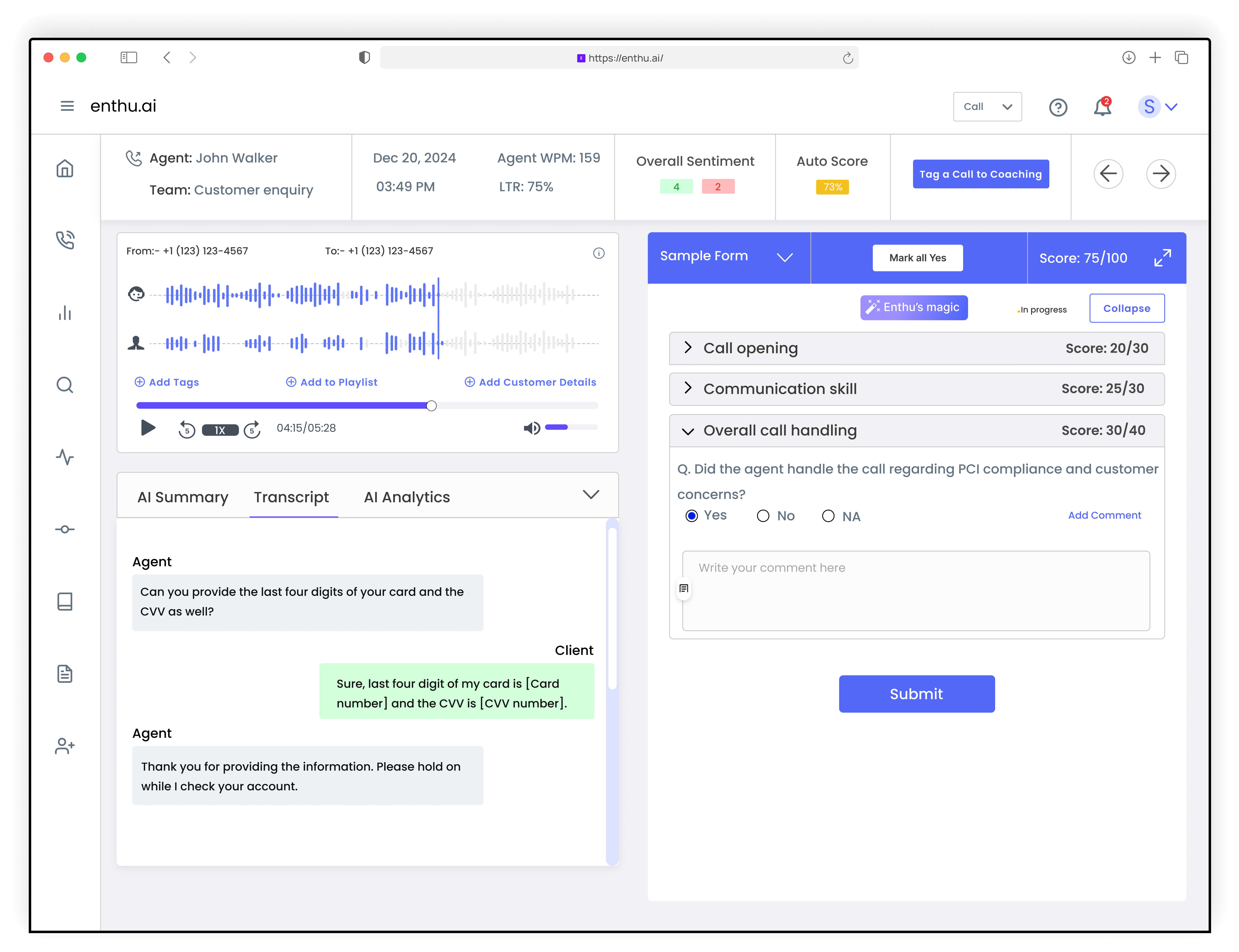
7. Selling through curiosity
In this, you ask the prospects questions that help you uncover prospects’ pain points, short-term goals, long-term ambitions, fears, and concerns.
Make the prospects feel that the sales rep is genuinely curious to know about him and his business.
Needless to say, a sales reps must strike balance between conversation and genuinity. It should feel like a two-way conversation rather than an interview.
You must go deep into conversations and understand what they do and most importantly why they do it.
At your training sessions, you must create different scenarios for your salespeople so that they can figure out different sales questions they’d ask the prospects.
8. Make sales reps understand buyer’s problems
You must put sales reps in prospect’s place to help them understand the needs and challenges of the buyer because as per Accenture, 77% of prospects believe that salespeople do not understand their needs.

Make the buyer’s journey the part of sales reps’ training.
In this, sales reps must face the problems that buyer’s face and let them come up with solutions. It is a great training exercise for new hire onboarding and the existing sales force.
Sales reps can also do role-play with their sales colleagues and find new ways to tackle common sales objections.
9. Focusing on Sales Process
Sales reps must be thorough with the sales process. They must know what each stage of sales process defines.
So, create courses that help sales reps to understand what activities need to be completed at each stage and how they can complete it.
Furthermore, you can provide them with sales assets and tactical training to handle common objections.
For example, your prospecting training could include modules on how to do research, what are the various ways to find leads and how to find them.
💡Pro Tips
Speech analytics is a very good way to identify training opportunities which otherwise go unnoticed.
10. Pre-boarding training
Pre-boarding means that new hires are provided with training content even before they stepped into the firm.
It makes the onboarding process easy and helps sales reps to complete basic training before Day 1 at the company.
It saves time and sales reps can start selling fast.
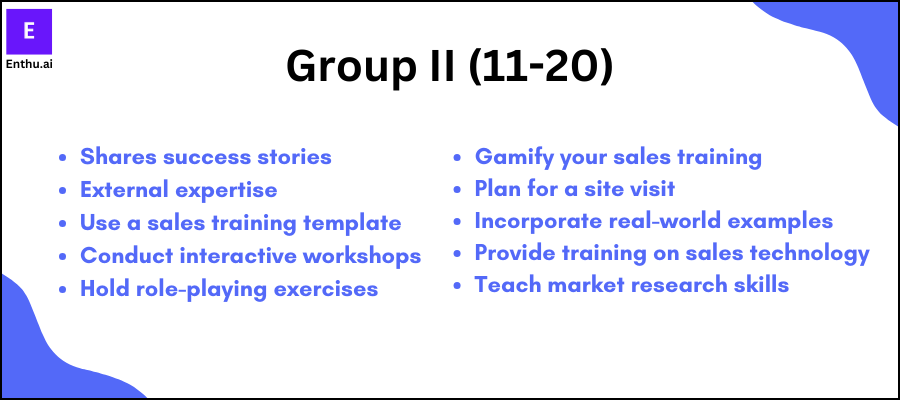
11. Shares success stories
Top-performing salespeople should share their success stories in sales meetings because as per Propeller, just 8% of the sales reps are making 80% of all sales.

In these meetings, you will get to know what top salespeople are doing differently and how they are doing it.
Let’s say, a sales rep has closed a big deal. Then, let him tell his story in the training session.
The sales rep must tell what objections he faces and how he overcomes them, what questions he asked, how he positioned value, and what he learned during the process.
Listening to these stories, some might pick up tricks that they can use in their next sales call.
12. External expertise
Even if you have the best sales managers in the team, then also there is no surety that they know everything.
So, it is always better to bring in experts from outside your company that can provide sales reps with a different view of the industry.
Sales reps can either go to workshops and conferences or some outside expert like industry leaders, hired consultants, etc., can come to speak to the team.
This exercise can help sales reps to learn new sales techniques and also what’s going on elsewhere in the industry.
13. Use a sales training template
A sales training template is a structured document that outlines the training and resources in one place for your sales team.
Because every sales team is unique, and their training needs may vary, creating a customized training plan to address unique product knowledge needs, market changes, and industry regulations is vital.
Sales training templates can be tailored to the unique needs of a company, product, or industry.
These templates typically include sections and categories like training objectives, materials, schedule, roles, budget, expenses, etc.
You can use it to plan, organize, and deliver effective training programs to your sales representatives.
14. Conduct interactive workshops
Interactive workshops are like fun group classes where everyone gets involved.
For example, you can conduct a workshop where participants can practice objection handling or negotiation techniques.
Your sales representatives might role-play different customer situations and practice responding confidently.
They could also participate in group discussions to share their experiences and learn from each other’s strategies.
These workshops serve as an invaluable platform for practicing and refining essential sales training topics, fostering a supportive environment for trying out new skills and receiving constructive feedback from colleagues, ultimately helps everyone improve together.
15. Hold role-playing exercises
Imagine you and your team are like actors preparing for a play. In sales, you’re often in front of customers, like a performance. Role-playing is like practicing for this show to make sure everyone knows their lines and actions.
How to use role-playing
- Start with customer research: Think about why customers choose your business.
- Create a safe environment: Make sure everyone knows it’s okay to make mistakes.
- Provide message training: Practice talking about your products or services consistently and interestingly.
- Share successes: Talk about successful sales stories and learn from them.
- Dig deeper: Learn about prices and features and why customers buy.
- Demonstrate specific scenarios: Consider common situations your team might face, like dealing with tough questions or introducing a new product.
- Identify key takeaways: After each role-playing session, discuss what everyone learned.
Benefits of role-playing:
These role-playing scenarios help your sales team prepare for different types of customers they might encounter in real sales situations.
By practicing these exercises, they’ll become more confident and skilled at handling various challenges and closing deals effectively.
Sales training example ‘role-playing’
- Indecisive customer scenario: Practice convincing customers who can’t decide.
- Detail-oriented customer scenario: Learn to answer detailed questions from customers who already know a lot.
- Distrustful customer scenario: Practice building trust with customers who may not believe in salespeople.
16. Gamify your sales training
Gamifying your sales training makes learning more fun and exciting. Instead of just sitting and listening, reps get to compete with their teammates and earn rewards for doing well.
It keeps your team interested and motivated to learn and improve their sales skills.
Different sales team training games
- Cold call bingo: Your reps get a bingo card with different phrases or objections they might hear during a cold call. When they hear one, mark it off on their card. The first person to get bingo wins!
- Jeopardy: It’s like a TV show! Your sales team answers questions about sales and earns points for correct answers. The team with the most points at the end wins.
- Gamified cold calls: Participants practice making cold calls in a fun way. They get points for every call they make and bonus points for every sale they close.
- Dice exercise: Roll a dice to see which sales scenario your team practices. It could be a cold call, a product demo, or a negotiation. Then, act it out with the teammates.
- Match game: Your sales reps match different sales techniques with the right situations. It’s like a memory game but with sales strategies!
- Elevator pitch: The sales team practices giving a quick pitch about your product or service. The goal is to grab someone’s attention in the time it takes to ride an elevator.
- Pop quiz: Participants get a surprise quiz with questions about sales. It keeps the team on their toes and helps them remember what they’ve learned.
- Next logical question: Your sales team practices asking questions that lead customers to the next step in the sales process. It helps them keep the conversation going smoothly.
- Pitch tournaments: The whole team competes with each other to see who can give the best sales pitch.
17. Plan for a site visit
Taking your sales team on a site visit means bringing them to the locations where your products or services are used.
For example, if you’re selling construction equipment, visiting a construction site allows your team to see how the equipment is used in real-world scenarios.
This firsthand experience helps them understand the product better and gives them valuable insights to share with potential customers during sales pitches.
18. Incorporate real-world examples
Instead of just discussing theoretical sales concepts, use real-life scenarios and case studies to illustrate key points.
For instance, you might share a case study detailing how a specific customer benefited from your product or service, highlighting the problem they faced, the solution provided, and the outcome achieved.
By showcasing real success stories, your team gains insight into how sales techniques translate into tangible results for customers.
This approach makes the training content more relatable & engaging and reinforces the practical application of sales strategies in various situations.
19. Provide training on sales technology
From CRM to marketing automation, analytics, productivity, generative AI, and more, today, salespeople use various modern tools and technologies to automate mundane work, respond quickly, and improve sales processes.
As a sales trainer, you must have the answers to the following questions.
- Has your business licensed a few sales tools and software?
- If yes, then how well can your reps use those tools?
- Are sales reps maximizing the potential of these tools?
- Have you provided any training on these tools?
It’s important to purchase some of these sales tools and provide training on how to use them efficiently.
You can also use the training offered by software companies. Many companies offer this for free, including advanced training.
Sales technology training empowers your sales reps to manage customer relationships more efficiently, track leads, and stay organized.
Eventually, it enables them to work with greater productivity and perform better in sales.
20. Teach market research skills
Teaching market research skills involves training your sales team to gather and analyze data about their target market, including customer demographics, industry trends, and competitors’ strategies.
This training enables them to create accurate buyer personas, understand evolving market dynamics, and identify customer pain points.
By leveraging market research insights, your team can effectively tailor their sales approach to address customer needs. Also, it helps increase the relevance and impact of their sales pitches.
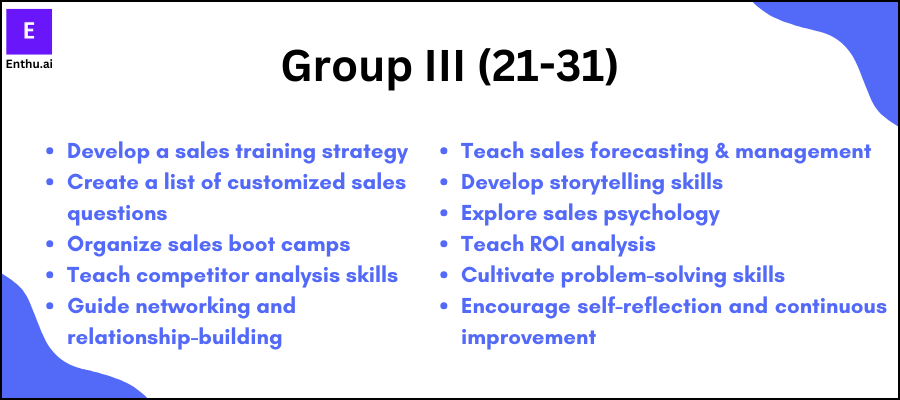
21. Develop a sales training strategy
A well-thought-out sales training strategy outlines the goals, objectives, and methods for training your team.
It should cover product knowledge, sales techniques, customer relationship management, and ongoing skill development.
Establishing a clear strategy ensures uniformity and effectiveness among your sales team, enhancing performance and sales results.
22. Create a list of customized sales questions
Providing your team with a set of tailored sales questions helps them uncover customer needs, address objections, and ultimately close more deals.
For example, if you’re selling software solutions, relevant questions might include asking about the customer’s current processes, pain points, and budget constraints.
These questions guide the conversation and demonstrate your team’s expertise and understanding of the customer’s business.
23. Organize sales boot camps
Sales boot camps are intensive training sessions to immerse your team in focused learning and skill development.
They typically cover a range of topics, from product knowledge to sales techniques, and involve interactive activities, role-playing exercises, and practical challenges.
Allocating focused time and resources to training facilitates rapid improvement in your team’s sales performance. This dedicated effort accelerates learning curves and drives immediate positive outcomes.
24. Teach competitor analysis skills
Understanding your competitors’ strengths, weaknesses, and market positioning is crucial for crafting effective sales strategies.
By teaching your team how to conduct competitor analysis, such as researching competitor products, pricing, and marketing strategies, they can identify competitive advantages and position your offerings more effectively in the market.
Moreover, knowing competitor’ strengths and weaknesses, you empower them to tailor their sales approach and differentiate your offerings based on value proposition and unique selling points.
25. Guide networking and relationship-building
Building strong relationships with customers and prospects is critical to long-term sales success.
Provide your team with guidance on networking strategies, such as attending industry events, joining professional associations, and leveraging social media platforms.
Incorporate sales training topics such as effective communication techniques, objection handling, and negotiation skills to enhance your team’s ability to connect with customers and close deals.
You enable your team to cultivate long-lasting partnerships that drive sales growth and customer retention by emphasizing genuine interactions and personalized engagement.
26. Teach sales forecasting and pipeline management
Sales forecasting and pipeline management are critical skills for managing sales activities and optimizing resource allocation.
Training on sales forecasting methods, pipeline tracking tools, and lead prioritization techniques enables your team to predict sales outcomes accurately, identify potential bottlenecks and take proactive measures to drive pipeline velocity.
Teaching these skills to your team helps them make informed decisions, maximize sales opportunities, and achieve consistent revenue growth.
27. Develop storytelling skills
Storytelling is a persuasive tool that allows sales professionals to communicate the value of their offerings compellingly and memorably.
Training in storytelling involves crafting narratives that resonate with customers’ emotions, address their pain points, and highlight the benefits of your product or service.
By mastering the art of storytelling, your team can engage customers more effectively and differentiate your offerings from competitors.
28. Explore sales psychology and persuasion techniques
Understanding the psychological principles behind buyer behavior and persuasion can help your team influence purchasing decisions more effectively.
Teach concepts such as social proof, scarcity, and reciprocity, and provide practical strategies for applying these principles in sales interactions.
Leveraging psychological insights empowers your team to build trust, overcome objections, and drive conversions.
29. Teach ROI analysis
Demonstrating your product or service’s return on investment (ROI) is essential for convincing customers of its value.
Provide your team with training on calculating and communicating ROI metrics, such as cost savings, revenue growth, or productivity gains.
Quantifying the benefits of your offering in terms that resonate with customers’ business objectives strengthens your team’s sales pitches and enhances their ability to close deals.
30. Cultivate problem-solving skills
Sales reps often face objections, setbacks, and complex customer scenarios.
Training them in problem-solving equips them with the ability to analyze challenges, devise effective solutions, and navigate obstacles during sales interactions.
Encourage techniques such as brainstorming sessions, role-playing exercises, and case studies to develop critical thinking and adaptive problem-solving skills.
You can empower your team with problem-solving skills, enabling them to confidently address customer concerns, overcome objections, and achieve sales success even in challenging situations.
31. Encourage self-reflection and continuous improvement
Sales excellence requires ongoing self-assessment and personal development. Encourage your team members to reflect on their performance, identify improvement areas, and set growth goals.
Provide tools such as performance evaluations, peer feedback sessions, and self-assessment exercises to facilitate self-reflection and development.
By fostering a culture of continuous improvement, your team can strive for excellence, adapt to evolving market dynamics, and consistently elevate their sales performance.
C. Importance of sales training
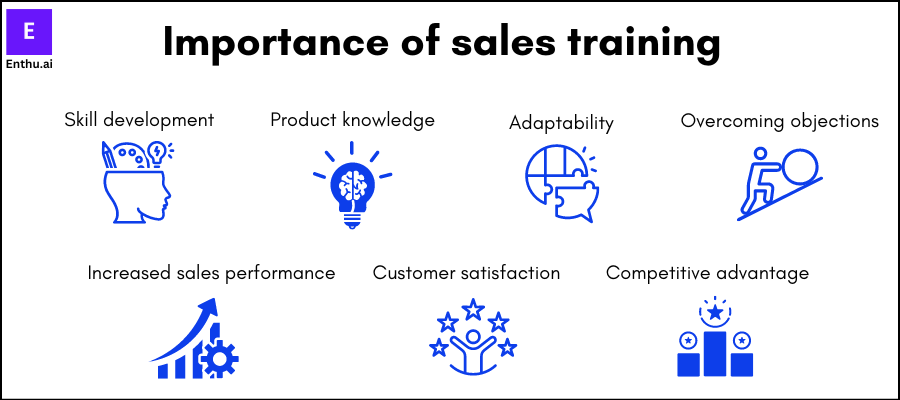
Sales training is of utmost importance for organizations and sales professionals alike.
It provides them with the necessary skills, knowledge, and techniques to effectively engage customers, promote products or services, and close deals.
Here are some key reasons why sales training is crucial:
1. Skill development
Sales training helps sales professionals develop essential skills such as effective communication, active listening, objection handling, and closing techniques.
These skills are vital for building relationships, understanding customer needs, and successfully closing sales.
2. Product knowledge
Ensures that salespeople have in-depth knowledge about the products or services they are selling.
This enables them to effectively showcase the features, benefits, and value propositions, which instills confidence in potential customers and increases the chances of making a sale.
3. Adaptability
The sales landscape is constantly evolving, and sales training helps professionals stay up-to-date with the latest industry trends, technologies, and sales methodologies.
It equips them with the flexibility and agility needed to adapt to changing customer preferences and market dynamics.
4. Overcoming objections
Sales training provides techniques and strategies for handling customer objections effectively.
Salespeople learn how to address concerns, alleviate doubts, and provide solutions that match the customer’s needs, ultimately increasing their chances of closing deals.
5. Increased sales performance
By improving sales skills, knowledge, and confidence, sales training directly contributes to enhanced sales performance.
It equips salespeople with the tools and strategies they need to meet targets, increase conversion rates, and generate revenue for the organization.
6. Customer satisfaction
Well-trained sales professionals can better understand customer needs and provide tailored solutions.
By delivering a positive buying experience, they can build trust, foster long-term relationships, and ultimately enhance customer satisfaction and loyalty.
7. Competitive advantage
Sales training provides organizations with a competitive edge.
Well-trained sales teams can differentiate themselves by delivering superior customer service, effectively positioning their products or services, and outperforming competitors in the marketplace.
Conclusion
These above sales training ideas and tactics will certainly help improve your sales team’s performance.
It’s important to know that sales training is not a one-time event but an ongoing process that should be integrated into your organization’s culture.
In today’s technologically advanced world, businesses that invest in sales training position themselves as market leaders and differentiate themselves from competitors—those who fail to adapt risk getting lost in the crowd.
One of the best ways to incorporate sales training into your organization is by leveraging advanced sales training software like Enthu.AI.
Enthu.AI helps sales reps learn and grow faster through continuous and actionable feedback, enabled by its speech AI and analytics capabilities.
FAQs
1. What are sales training ideas? Sales training ideas include role-playing sales situations, workshops on product knowledge, the development of soft skills, objection handling strategies, CRM training, sales coaching, mock presentations, exercises in customer empathy, data analysis abilities, and ongoing feedback sessions for progress. 2. What are the 4 types of sales training? The four types of sales training include product training, skill-based training, process training, and industry/competitor training. These cover product knowledge, sales skills, sales processes, and understanding the industry and competition. 3. How do you give a good sales training? To give a best sales training, start by assessing the needs of the participants. Use a combination of interactive methods, real-life examples, role-plays, and practical exercises to engage learners and reinforce key concepts. Provide ongoing support and feedback for continuous improvement. 4. What are some examples of effective sales training? Role-playing customer interactions, mastering objection handling, learning negotiation tactics, and expanding product knowledge are key parts of effective sales training. Real-world scenarios and feedback sessions help improve sales skills, boost confidence, and enhance overall performance.




 On this page
On this page








